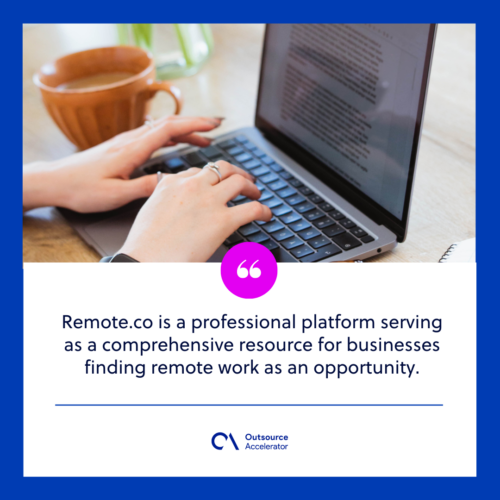The Increase of Remote Professionals: Key Benefits for Employers and Staff Members
The emergence of remote specialists has undoubtedly reshaped traditional workplace dynamics, providing engaging advantages for both employers and employees. The implications of this pattern extend beyond plain logistics, prompting a deeper assessment of how remote job affects productivity and business society.
Raised Versatility for Employees
Embracing remote work arrangements enables staff members to delight in unprecedented versatility in their daily regimens. This newfound freedom allows people to tailor their job schedules to align with individual dedications, boosting work-life balance. Employees can allot time a lot more successfully, taking care of family members demands, individual advancement, or wellness and wellness tasks without the restraints of conventional office hours.
Moreover, the ability to function from numerous areas promotes a feeling of liberty that can dramatically reduce stress levels. This versatility can cause enhanced work complete satisfaction, as employees really feel much more in control of their responsibilities and settings. The elimination of prolonged commutes better improves this adaptability, enabling workers to recover useful time that can be redirected towards both specialist jobs and personal passions.
Raised flexibility also equips workers to produce optimal job conditions that fit their individual choices, whether they grow in a quiet home workplace or in a vibrant coffee shop setting. This personalized technique can enhance performance and creativity, as individuals are more likely to involve deeply with their jobs in atmospheres where they really feel comfortable and concentrated. Ultimately, the change towards remote work presents a transformative possibility for staff members to redefine their expert experiences.
Accessibility to Worldwide Talent
The change towards remote work not only advantages employees yet additionally opens new opportunities for employers seeking to expand their ability swimming pool. By embracing remote job, organizations can touch into a varied series of abilities and experiences from around the world. This availability permits employers to hire leading talent, despite geographical restrictions.
Access to worldwide talent enhances innovation and creative thinking within teams. When individuals from numerous cultural backgrounds and professional experiences collaborate, they bring one-of-a-kind point of views that can bring about more reliable analytical and revolutionary concepts. Recruiting internationally assists companies load ability spaces that might exist in local markets, making certain that they stay affordable in an ever-evolving landscape - Remote Professionals.
In addition, the ability to work with remote professionals can considerably improve labor force diversity. A varied group not just fosters a much more comprehensive workplace however additionally enhances a company's credibility, attracting additional skill and consumers that value corporate responsibility.
Cost Savings for Employers
As organizations increasingly adopt remote job practices, they can recognize considerable expense savings that straight affect their bottom line. By allowing workers to function from home, companies can reduce expenditures related to workplace room, utilities, and maintenance.
In addition, remote job can lower employee-related costs, such as travelling reimbursements and on-site features like treats and drinks. Employers can additionally gain from a more comprehensive talent pool, allowing them to work with professionals from regions with lower income assumptions without compromising on skills or credentials.
Additionally, firms may experience reduced employee turnover rates, causing lowered recruitment and training prices. The flexibility of remote job typically converts to higher job fulfillment, which can foster loyalty and minimize the expenses related to employing and onboarding new talent.

Improved Work-Life Equilibrium
Attaining an unified work-life equilibrium has actually ended up being progressively attainable for remote experts, contributing substantially to their overall health. The adaptability integral in remote job permits individuals to tailor their schedules around personal dedications, such as family time, workout, and hobbies. This adaptability not only minimizes tension yet additionally fosters a much healthier lifestyle.
Furthermore, remote job removes the commonly taxing commute, which link can interfere with personal time. By reclaiming those hours, workers can spend in tasks that enhance their quality of life, ultimately causing enhanced psychological health and wellness. This change in the direction of an extra well balanced lifestyle can decrease burnout and increase work contentment.
Employers gain from this improved work-life equilibrium as well, as satisfied employees are much more most likely to remain fully commited to their roles. A helpful workplace that focuses on personal well-being can result in reduced turnover rates and a much more cohesive team dynamic.

Better Efficiency and Efficiency
Remote professionals usually experience an exceptional increase in productivity and efficiency, with studies showing that up to 30% of remote workers report higher effectiveness contrasted to their in-office counterparts. The versatility of remote job additionally enables workers to customize their timetables to come to a head productivity hours, resulting in finished jobs that meet or exceed assumptions.
In addition, remote work commonly creates a much more comfortable and tailored work space, minimizing distractions frequently found in typical workplace settings. The autonomy related to remote work motivates staff members to take ownership of their responsibilities, promoting a sense of accountability that drives performance.

Conclusion
The relationship in between remote job and raised performance, along with reduced turnover prices, additionally strengthens the affordable edge for organizations embracing you can try this out such plans. Inevitably, remote work fosters a mutually useful atmosphere.
Eventually, the shift towards remote work provides a transformative opportunity for employees to redefine their professional experiences.
The change in the direction of remote work not just benefits employees but additionally opens next up new methods for employers seeking to broaden their ability pool.Remote professionals often experience an impressive boost in efficiency and performance, with researches indicating that up to 30% of remote employees report greater effectiveness compared to their in-office equivalents. The versatility of remote work likewise allows workers to tailor their timetables to peak productivity hours, resulting in finished tasks that meet or exceed assumptions.
In final thought, the change to remote work not only improves employee complete satisfaction but additionally substantially contributes to boosted productivity and efficiency within companies.
 Tina Majorino Then & Now!
Tina Majorino Then & Now! Pauley Perrette Then & Now!
Pauley Perrette Then & Now! Andrew McCarthy Then & Now!
Andrew McCarthy Then & Now! Bill Cosby Then & Now!
Bill Cosby Then & Now! Nicholle Tom Then & Now!
Nicholle Tom Then & Now!